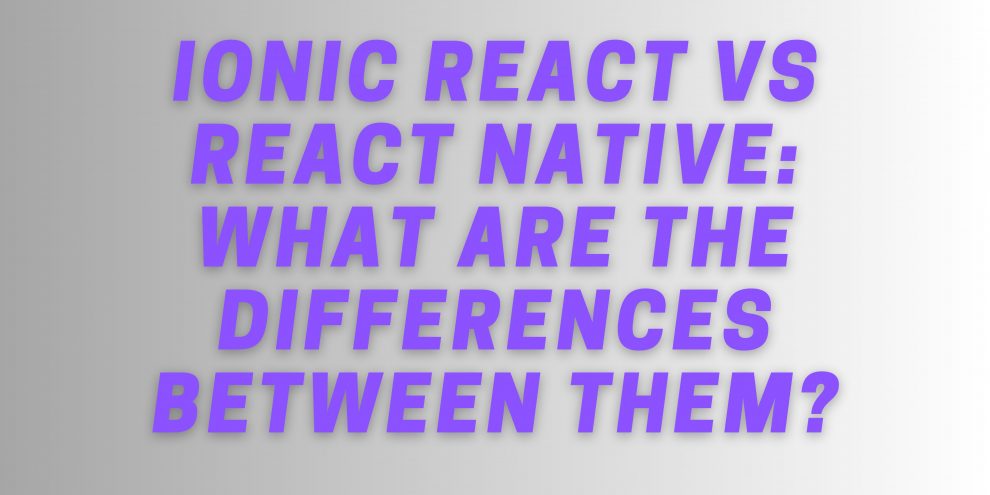Ionic React(IR) and React Native are two of the most popular frameworks for developing cross-platform mobile apps. Both frameworks use JavaScript to build user interfaces, but they have different approaches to rendering those UIs. IR uses web technologies like HTML, CSS, and JavaScript to create native-looking mobile apps. On the other hand, React Native utilizes React to construct UIs, rendering them directly to native platform components.
Popularity
Both IR and React Native offer a number of advantages over traditional native app development, making them popular frameworks for developing cross-platform mobile apps.For one, they allow developers to build apps for multiple platforms using a single codebase. This can save a lot of time and effort, especially for small teams with limited resources.
Another advantage is that they make it easier for developers to use their existing skills. If you are already familiar with web development, then you can easily learn to build mobile apps with IR. And if you are already familiar with React, then you can easily learn to build mobile apps with React Native.
Key differences
The key differences between IR and React Native are:
Approach:
IR is a web-first framework, while React Native is a native app development framework.Performance:
React Native generally has better performance than IR, as it uses native UI controls and animations.Cross-platform support:
IR officially supports iOS, Android, Electron, and the web using Progressive Web App technology. React Native officially supports iOS and Android only.Development experience:
Both IR and React Native have large communities and good documentation. However, React Native is more mature and has a wider range of libraries and tools available.
Ionic React vs React Native: Different Approaches to Cross-Platform Mobile App Development
Different approaches to rendering user interfaces are taken by IR and React Native.
Ionic React
It is a web-first framework. This means that it uses web technologies like HTML, CSS, and JavaScript to create native-looking mobile apps. IR does this by wrapping web components in native containers. This allows IR apps to have the look and feel of native apps, while still using the same development tools and techniques that web developers are familiar with.
React Native
React Native is a native app development framework. This means that it uses React to build UIs that are rendered directly to native platform components. This gives React Native apps the same performance and look and feel as native apps developed using traditional methods.
Advantages and disadvantages
Each approach has its own advantages and disadvantages.
Ionic React
The main advantage of Ionic React is that it is easier to learn and use than React Native. This is because it uses web technologies that web developers are already familiar with. Additionally, It has a large community of users and developers, which means that there is a lot of support and resources available.
The main disadvantage is that it may not have the same performance as React Native apps. This is because Ionic React apps are essentially web apps that are running in a native container. However, these apps can still be very performant, especially if they are optimized for the specific platform.
React Native
The main advantage of React Native is that it offers better performance than Ionic React apps. This is because React Native apps are rendered directly to native platform components. Additionally, React Native has a wider range of libraries and tools available, which makes it easier to develop complex apps.
The main disadvantage of React Native is that it is more difficult to learn and use than IR. This is because React Native requires developers to have a good understanding of React and native app development. Additionally, React Native is a newer framework than Ionic React, so there is less support and resources available.
Which approach is right for you?
The best approach for you will depend on your specific needs and requirements. If you are looking for a framework that is easy to learn and use, and you are willing to sacrifice some performance, then Ionic React is a good choice. If you are looking for a framework that offers the best possible performance and you are willing to put in the time to learn React and native app development, then React Native is a good choice.
Here are some additional factors to consider when choosing between the two approaches:
Your team’s skills and experience:
If your team is already familiar with web development, then IR will be a good fit. If the team is already familiar with React, then React Native will be a good fit.Your app’s performance requirements:
If your app needs to have high performance, then React Native is the better choice.Your app’s complexity:
If you are developing a complex app, then React Native is the better choice. React Native has a wider range of libraries and tools available, which makes it easier to develop complex apps.
Ionic React vs React Native: Performance Comparison
React Native generally has better performance than Ionic React. This is because React Native apps are rendered directly to native platform components. Ionic React apps, on the other hand, are essentially web apps that are running in a native container. This means that there is an additional layer of indirection, which can lead to some performance overhead.
However, IR apps can still be very performant, especially if they are optimized for the specific platform. For example, these developers can use native plugins to access native APIs and components. This can help to improve the performance of IR apps, especially for tasks that are computationally expensive.
Here is a summary of the performance advantages and disadvantages of Ionic React and React Native:
Ionic React
Advantages:
- Easier to learn and use
- Larger community and more support available
Disadvantages:
- May not have the same performance as React Native apps
React Native
Advantages:
- Better performance than IR apps
- Wider range of libraries and tools available
Disadvantages:
- More difficult to learn and use
- Smaller community and less support available
Which framework is better for performance?
If performance is your top priority, then React Native is the better choice. However, Ionic React apps can still be very performant, especially if they are optimized for the specific platform.
Here are some tips for improving the performance of Ionic React apps:
- Use native plugins to access native APIs and components.
- Avoid using too many web components, as this can lead to performance overhead.
- Optimize your CSS and JavaScript code.
- Use a tool like Ionic Profiler to identify and fix performance bottlenecks.
Ionic React vs React Native: Cross-Platform Support Comparison
Ionic React and React Native both offer cross-platform support, but in different ways.
Ionic React
This officially supports iOS, Android, Electron, and the web using Progressive Web App (PWA) technology. This means that you can build a single Ionic React app and deploy it to all four platforms with minimal changes.
React Native
React Native officially supports iOS and Android only. However, there are third-party libraries and tools that can be used to build React Native apps for other platforms, such as Windows, macOS, and Linux.
PWA support
One of the key advantages of Ionic React over React Native is its support for PWAs. Web apps, which can be installed on mobile devices and used like native apps, constitute PWAs. They also function offline and possess access to various native features, including push notifications and geolocation.
Developers who want to build cross-platform mobile apps, installable on mobile devices and functioning like native apps, yet also wish to access the web and establish a web presence, find Ionic React to be a good choice.
Which framework is better for cross-platform support?
If you need to deploy your app to multiple platforms, including the web, then IR is the better choice. However, if you only need to deploy your app to iOS and Android, then React Native is a good choice.
Here are some additional factors to consider when choosing between Ionic React and React Native for cross-platform development:
Your app’s target platforms:
If you need to deploy your app to multiple platforms, including the web, then this is the better choice. However, if you only need to deploy your app to iOS and Android, then React Native is a good choice.Your team’s skills and experience:
If your team already has familiarity with web development, Ionic React will be a good fit. If team is already acquainted with React, React Native will be a suitable match.Your app’s complexity:
If you are developing a complex app, then React Native is the better choice. React Native has a wider range of libraries and tools available, which makes it easier to develop complex apps.
Ionic React vs React Native: Best Use Cases
These both can be used to build a wide variety of mobile apps, but there are some specific use cases where each framework is better suited.
Ionic React
This is a good choice for developers who want to build cross-platform mobile apps quickly and easily. It is also a good choice for developers who are already familiar with web development.
Here are some specific use cases for Ionic React:
Progressive Web Apps (PWAs):
It is a good choice for building PWAs because it has built-in support for PWA features such as push notifications, offline access, and app installation.Enterprise apps:
IR is a good choice for building enterprise apps because it is scalable and secure. It also includes features well-suited for enterprise development, such as supporting role-based access control and integrating with enterprise backend systems.Content-driven apps:
The IR is a good choice for building content-driven apps, such as news apps, blog apps, and e-commerce apps. This is because it makes it easy to create and display dynamic content.
React Native
React Native is a good choice for developers who want to build high-performance native apps with React. It is also a good choice for developers who want to access native APIs and components.
Here are some specific use cases for React Native:
Performance-critical apps:
React Native is a good choice for building performance-critical apps, such as games and real-time apps. This is because React Native apps are rendered directly to native platform components.Native API and component access:
React Native is a good choice for developers who need to access native APIs and components. This is because React Native makes it easy to call native APIs and render native components directly from React code.Complex apps:
React Native is a good choice for developing complex apps. This is because React Native has a wide range of libraries and tools available, which makes it easier to develop complex apps.
Which framework is right for your project?
The best framework for your project will depend on your specific needs and requirements. If you are looking for a framework that allows you to build cross-platform mobile apps quickly and easily, then IR is a good choice. If you are looking for a framework that allows you to build high-performance native apps with React, then React Native is a good choice.
Here are some additional factors to consider when choosing between Ionic React and React Native:
Your team’s skills and experience:
If your team already possesses familiarity with web development, consider Ionic React as a suitable fit. If it is already acquainted with React, consider React Native as a good fit.Your app’s performance requirements:
If your app needs to have high performance, then React Native is the better choice.Your app’s complexity:
If you are developing a complex app, then React Native is the better choice. React Native has a wider range of libraries and tools available, which makes it easier to develop complex apps.
Ultimately, the best way to decide which framework is right for your project is to try both of them out and see which one you prefer.
Summing Up
Choose Ionic React for an accessible framework supporting PWAs, enterprise, and content apps. Opt for React Native for high-performance, native API access. GeekyAnts, a top software development company experienced in both, can guide you to the ideal choice and develop a top-notch mobile app tailored to your needs. Reach out for more information on their cross-platform mobile app development services and how they can assist in building your successful app. Feel free to contact us today, and let’s collaborate on bringing your vision to life.
FAQs
What is Ionic React, and what is React Native?
- Ionic React is based on the Ionic framework and leverages web technologies (HTML, CSS, and JavaScript).
- React Native is developed by Facebook and utilizes React to build native mobile applications using JavaScript and React.
How do they achieve cross-platform compatibility?
Ionic React uses a web view to render the user interface, making it cross-platform by default. React Native compiles components to native modules, allowing it to run on both iOS and Android devices.
Access to Native Features: How well do they integrate with device capabilities?
- React Native provides more direct access to native APIs, offering better integration with device features.
- Ionic React relies on plugins to access native functionality, which may not be as seamless.
Learning Curve: Which one is easier for developers to pick up?
- Ionic React is often considered easier for web developers to pick up, given its use of standard web technologies.
- React Native may have a steeper learning curve, especially for those unfamiliar with native mobile development concepts.

























